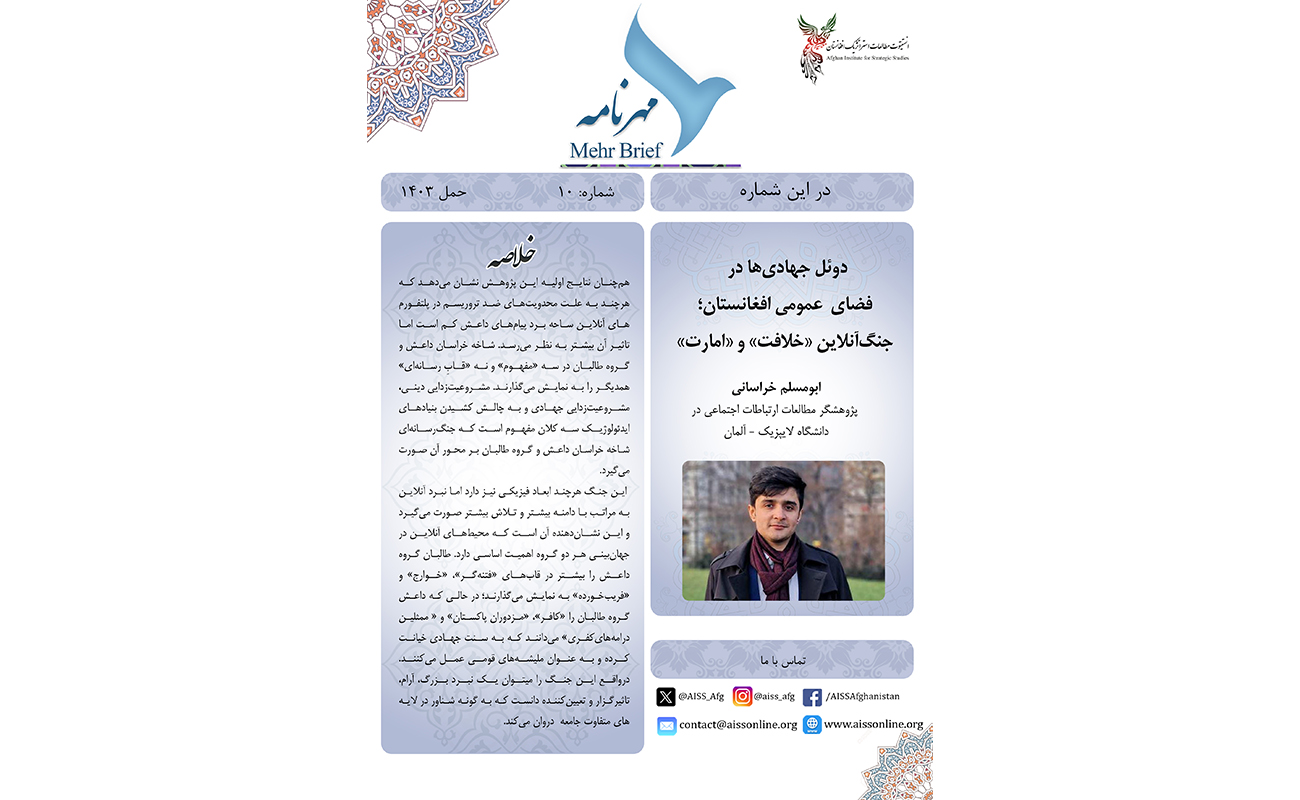10th vol. of the AISS Mehr Brief "Jihadi Duel in the Afghan Public Sphere"
The Afghan Institute for Strategic Studies, in collaboration with the University of Leipzig in Germany, has published its 10th Mehr Brief entitled "The Duel of Jihadists in the Public Sphere of Afghanistan: The Online War Between the ISKP and the Taliban Groups." This paper examines the online war between the Taliban and ISIS in Afghanistan and presents essential findings in this field.
Key findings of this paper
The online war between the Taliban and ISIS has occupied a significant part of the Afghan online public sphere. This war is increasingly expanding by producing and disseminating text, image, and video content on websites, social networks, and other platforms.
This war also has an impact at the regional and global levels. The consequences of this war go beyond Afghanistan's borders and can lead to the recruitment of forces and the intensification of insecurity in other parts of the region and the world.
The online propaganda of these groups contributes to the spread of religious extremism and Islamic fundamentalism. The content produced by the Taliban and ISIS groups in the online space promotes hate speech, violence, and discrimination and exacerbates religious and social tensions.
ISIS, despite anti-terrorism restrictions on online platforms, is looking to attract an audience through impactful content. Using various content production techniques, ISIS tries to present itself as a powerful and legitimate group and encourages young people to join it.
The Taliban and ISIS portray each other in three "concepts" and nine "media frames":
1. Religious delegitimization: Both groups try to question each other's religious legitimacy and present themselves as the only true representative of Islam.
2. Jihadi delegitimization: Both groups question each other's jihadi record and present themselves as the true defenders of jihad.
3. Challenging ideological foundations: Both groups criticize each other's ideological foundations and try to highlight the contradictions in each other's ideology.
The Taliban considers ISIS as "Seditionists," "Kharijites," and "deceived." The Taliban accuses ISIS of deviating from the path of jihad and committing unjustified violence.
ISIS considers the Taliban as "infidels," "mercenaries of Pakistan," and "actors of infidel dramas." ISIS accuses the Taliban of compromising with infidel governments and betraying jihadist ideals.
This online war is a large, quiet, influential, and decisive battle penetrating different societal layers. It is imperceptibly changing thoughts and values in Afghan society and can have long-term consequences for the country's future.
The author of this paper, Abu Moslim Khorasani, says: "The online war between the Taliban and ISIS is increasingly expanding and has dire security and social consequences for Afghanistan and the region. This war not only threatens the security and stability of Afghanistan but can also lead to the spread of extremism and violence in other parts of the region and the world."
Please find below the link to download the 10th volume of the AISS Mehr Brief. Please note that this particular Mehr Brief is only available in Persian. You can also access the English translation of the key findings of the research by clicking on the link provided.

